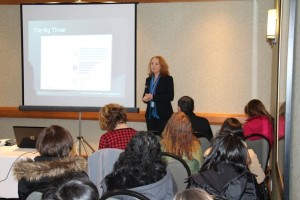One amazing situation/question passed on by my student audience at SFU’s Backpack to Briefcase Conference last Saturday: In this competitive labour market, where everyone is so driven, so talented, so educated, and so willing to show s/he has the skills and passion to do the job, how do we, as candidates, distinguish ourselves, how do we find that unique side we all supposedly have?
Theodore Roosevelt’s words, “Believe you can, and you’re halfway there” stand strong when I think about this. We would all benefit from each others’ thoughts on this topic, so I’m considering the front open to comments. As far as I’m concerned, there are not two people alike, not even after a so called “superficial” five minutes conversation. We’re usually not doing a good enough job at getting to know ourselves, and that doesn’t stop at youth or digital gen, but applies to all of us, thus we need help from others (anyone who can be completely honest will do) and we need to access/ use available personality tests (MBTI, Personality Dimensions) to run a comprehensive research on ourselves. We need to start with understanding ourselves, this comes first. When we have a chance to talk to prospective employers at an event, they will see through us right away (surveys say it’s a game of seconds). We need to be able to help them see the whole we represent: our abilities, soft skills, transferable skills, all of it conveyed in a certain way, all of it properly displayed. Imagine yourself at a professional event, walking elegant, talking with confidence, smiling. Yes, you need that kind of day dreaming.
Then reality kicks in, and at the same event we have just imagined ourselves shining, we stumble into things, or people, or just mumble what was supposed to be a glorious introduction speech. When we look back, we think “gosh, I should’ve said that!” Something’s missing, right? Yes, you’ve got it, it’s called practice. A gold medal doesn’t come without hard work and lots of perspiration, so imagine the job of your dreams is that gold medal. Fight for it. Think about your story. Have it ready. Say it with confidence. One of the students told me he kept a job along to pay for his own studies and I could see the sparkle in his eyes, he was proud of what he has achieved. I liked that. So I encouraged him to use his survival story, make it beautiful, tell it to his friends, and become a natural at taking about it. A short and compelling story, told from your heart. That is what will differentiate you from others. People remember stories, and while not all of us are good story tellers, here’s the good news: most of us have improved by working at it. Once you became good at it – you may add this skill to your portfolio.
Magdalena Mot


